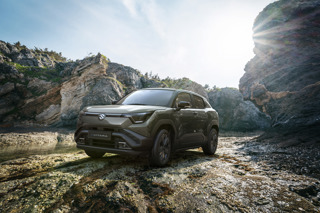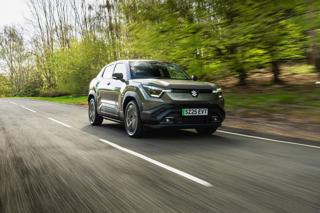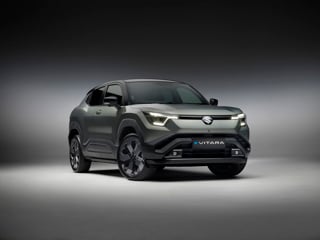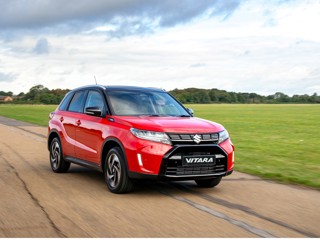Fringe player Suzuki is seeking to go mainstream in fleet. It’s a big change from its position a decade ago, so what prompted the move, asks Stephen Briers

The message from management was loud and clear: we are not interested in fleet. That was Suzuki GB’s position a decade ago, a time when fleet registrations accounted for less than 5% of its total UK volume.
The carmaker had publicly stated that it had little interest in the corporate sector; it was a retail-only operation targeting the most profitable area of business.
And that’s the way it stayed, until 2011 when Suzuki appointed its first ever corporate sales manager, Andrew Wale, with a brief to create a fleet strategy. Wale has overseen a nine-fold increase in fleet registrations, an impressive statistic, although, put in context, the carmaker remains on the fringes.
In 2010, it registered 1,032 fleet cars for a 0.1% share of the sector; last year that had risen to 9,432 units and 0.6%, according to official figures from the Society of Motor Manufacturers & Traders (SMMT). Of the household names, only Lexus, Mitsubishi and Dacia took a smaller share.
Nevertheless, fleet now accounts for almost 25% of Suzuki’s annual registrations – albeit some way behind the industry average of 51% – and the carmaker has sizeable ambitions underlined by the appointment in January of former Maserati national corporate sales manager Graeme Jenkins as its first head of fleet.
So what has changed Suzuki’s view of fleet?
Partly product: Suzuki has expanded out of its heartland of small cars (Ignis, Swift) and 4x4s (Jimny, Vitara) into compact family cars (Baleno) and crossovers (SX-4 S-Cross) where corporate sales are more dominant.
It has also made its conventional products more appealing to user-choosers at a time when more are considering downsizing to smaller cars and turning to petrol in the face of the relentless media and Government onslaught against diesel.
But it’s also about aspirations: Suzuki realises that it cannot continue to grow in the UK by ignoring more than half of the market.
However, it has decided to enter the fleet sector with gusto at a time when competition has never been fiercer. Relative newcomers such as Kia, Hyundai, Škoda and Seat are making big gains; premium brands like BMW and Audi are becoming the new mass market; and traditional players like Vauxhall and Ford are tussling for every morsel of market share.
That doesn’t deter Jenkins, or Suzuki GB director Dale Wyatt. Both are convinced they have the products and the strategy to achieve their objective – to hit 20,000 fleet sales.
They are not looking for quick wins, although Suzuki has grown its Motability business from zero to 2,000 units in the past 18 months, largely on the back of Ignis and Vitara, and expects to increase it further to 3,000 over the next year. Rental is firmly not an option, though.
According to Wyatt, the approach is “sanity not vanity – we have to make a living out of it”.
Wyatt explains: “We have a much greater opportunity with our latest product, such as Vitara and S-Cross and we also have technology that is more fleet-friendly. We have greater capability – our scale has gone from 20,000 to 40,000 – so we can fund more things. We are outselling other manufacturers in retail, where we are 17th, but we are languishing in fleet. We want the same level of success in fleet as we have in retail.”
The first step, he adds, is to build the infrastructure by investing in the fleet team. Suzuki has appointed a cost of ownership manager and is recruiting a contract hire and leasing manager. The team also includes a marketing specialist, two fleet coordinators and two fleet administrators.
It is putting the foundations in place to boost its profile with key fleet stakeholders, including its own dealer network.
“We have dealer think tanks on fleet where we have open discussions to get our dealers engaged and excited,” says Wyatt. “We are aware that we are a retailed-biased network but a lot of them are good at fleet with other brands. They are enthusiastic about the opportunities with Suzuki.”
Later this year, as part of its “fleet evolution”, Suzuki will introduce a fleet service programme to improve its service, mainten-ance and repair (SMR) proposition. It will focus on component pricing, labour rates and service expectations to ensure its aftersales proposition remains competitive.
Suzuki has identified three fleet “sweet spots” where it is prioritising its resources: Motability, leasing and small- and medium-sized enterprises (SMEs).
Jenkins says: “We have to gain traction with the contract hire and leasing industry to generate core fleet business. We will be avoiding short-cycle, distressing channels to concentrate on leasing and SME.”
Core fleet for Suzuki is predominantly user-chooser, where success comes from creating demand for products backed-up by support for fleets and leasing companies, rather than the price-led job-need sector. “The key is to make it easy to do business with us,” says Wyatt.
Jenkins adds: “Also, leasing will give us access to the broker network indirectly, which is an incremental channel. And we see a massive opportunity in the public sector – our range fits.”
Both local business and public sector sales will be facilitated through a white-label contract hire product with Lex Autolease, which is on the local government framework; it will also help Suzuki to exploit the growing trend for personal contract hire (PCH).
Jenkins is planning a major fleet launch in June where Suzuki will present its product plans and growth aspirations to the leasing sector, major end user fleets and the pricing guides.
“We will make everyone aware that we are serious about fleet,” he says. “For the first time we have four or five models for fleets. We don’t have to rely on just one. We are now a genuine choice.”
Wyatt agrees: “We have a good model balance. Now it’s about working on our channel balance.”
Why Suzuki? ‘Small cars and ease of business’
With so many model options for fleets and their company car drivers to choose from, why should they consider Suzuki?
The reason is two-fold, according to Graeme Jenkins. First, product: Suzuki has several small cars which are ideal for those looking to downsize, and it has efficient petrol engines to tap into the current discontent with diesel. Second, it is striving to be easy to do business with for fleets and leasing companies.
“We will have consistent pricing for the leasing industry, the right people in the field, transparent relationships and centralised invoicing and admin,” says Jenkins.
“The driver experience is key – to drive it is to buy it. We have a test-drive conversion ratio of 70-80%. We call the driver experience ‘smile on wheels’.”
Two engines are expected to dominate fleet sales: the new 1.0-litre BoosterJet petrol engine (likely to account for two-thirds of sales) and the 1.2-litre DualJet, which will also be available as a mild hybrid.
“The BoosterJet petrol engine offers the same CO2 benefits and economy of diesel,” says Jenkins. “It is a big opportunity. But the mild hybrid is also efficient at less than 100g/km without adding huge cost.”
An integrated starter motor assists the engine, enabling the car to run at zero emissions below 10mph while improving the stop-start experience in traffic. It also offers 30 seconds of extra power under full throttle – it’s not just about economy.
The engine will be available from June on Swift (97g/km), Boleno (93g/km) and Ignis (97g/km).


















Field Guy - 24/05/2017 15:17
They are making good value and efficient vehicles without doubt but size is going to be an issue. Vitara is small and the roomiest is the S-Cross but even that is only previous generation Qashqai size, 75-100L of boot too small for me. Look at Ateca, Tucson, Sportage, 3008 etc. They need a bigger model for fleet. Something like a super efficient Grand Vitara with decent refinement would be bang on what people want at the moment. The bigger platform would probably give them more scope to upscale the light hybrid tech a notch to help with efficiency and BIK thus helping fleet sales progress considerably. Using an engine front and just an electric motor for the rear axle gives the opportunity for them to keep their 4wd heritage but with low emissions. You can borrow that idea Suzuki for free.